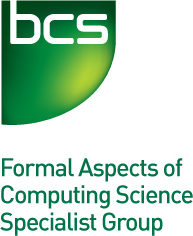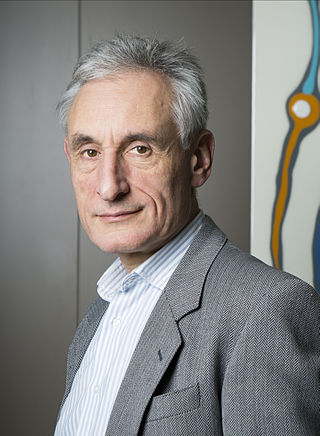
In computer science, model checking or property checking is a method for checking whether a finite-state model of a system meets a given specification. This is typically associated with hardware or software systems, where the specification contains liveness requirements as well as safety requirements.

Judea Pearl is an Israeli-American computer scientist and philosopher, best known for championing the probabilistic approach to artificial intelligence and the development of Bayesian networks. He is also credited for developing a theory of causal and counterfactual inference based on structural models. In 2011, the Association for Computing Machinery (ACM) awarded Pearl with the Turing Award, the highest distinction in computer science, "for fundamental contributions to artificial intelligence through the development of a calculus for probabilistic and causal reasoning". He is the author of several books, including the technical Causality: Models, Reasoning and Inference, and The Book of Why, a book on causality aimed at the general public.

Samson Abramsky is Professor of Computer Science at University College London. He was previously the Christopher Strachey Professor of Computing at Wolfson College, Oxford, from 2000 to 2021.

The Lovelace Medal was established by the British Computer Society in 1998, and is presented to individuals who have made outstanding contributions to the understanding or advancement of computing. It is the top award in computing in the UK. Awardees deliver the Lovelace Lecture.

The Department of Computer Science is the computer science department of the University of Oxford, England, which is part of the university's Mathematical, Physical and Life Sciences Division. It was founded in 1957 as the Computing Laboratory. By 2014 the staff count was 52 members of academic staff and over 80 research staff. The 2019, 2020 and 2021 Times World University Subject Rankings places Oxford University 1st in the world for Computer Science. Oxford University is also the top university for computer science in the UK and Europe according to Business Insider. The 2020 QS University Subject Rankings places The University of Oxford 5th in the world for Computer Science.

BCS-FACS is the BCS Formal Aspects of Computing Science Specialist Group.

Simon Peyton Jones is a British computer scientist who researches the implementation and applications of functional programming languages, particularly lazy functional programming.

Zoubin Ghahramani FRS is a British-Iranian researcher and Professor of Information Engineering at the University of Cambridge. He holds joint appointments at University College London and the Alan Turing Institute. and has been a Fellow of St John's College, Cambridge since 2009. He was Associate Research Professor at Carnegie Mellon University School of Computer Science from 2003–2012. He was also the Chief Scientist of Uber from 2016 until 2020. He joined Google Brain in 2020 as senior research director. He is also Deputy Director of the Leverhulme Centre for the Future of Intelligence.

Ian Robert Horrocks is a professor of computer science at the University of Oxford in the UK and a Fellow of Oriel College, Oxford. His research focuses on knowledge representation and reasoning, particularly ontology languages, description logic and optimised tableaux decision procedures.

Christopher Michael Bishop is a British computer scientist. He is a Microsoft Technical Fellow and Director of Microsoft Research AI4Science. He is also Honorary Professor of Computer Science at the University of Edinburgh, and a Fellow of Darwin College, Cambridge. Chris was a founding member of the UK AI Council, and in 2019 he was appointed to the Prime Minister’s Council for Science and Technology.

Andrew Blake FREng, FRS, is a British scientist, former laboratory director of Microsoft Research Cambridge and Microsoft Distinguished Scientist, former director of the Alan Turing Institute, Chair of the Samsung AI Centre in Cambridge, honorary professor at the University of Cambridge, Fellow of Clare Hall, Cambridge, and a leading researcher in computer vision.
Amanda Elizabeth Chessell is a computer scientist and a Distinguished Engineer at IBM. She has been awarded the title of IBM Master Inventor. She is also a Member of the IBM Academy of Technology.

Jane Elizabeth Hillston is a British computer scientist who is professor of quantitative modelling and former head of school in the School of Informatics, University of Edinburgh, Scotland.
PRISM is a probabilistic model checker, a formal verification software tool for the modelling and analysis of systems that exhibit probabilistic behaviour. One source of such systems is the use of randomization, for example in communication protocols like Bluetooth and FireWire, or in security protocols such as Crowds and Onion routing. Stochastic behaviour also arises in many other computer systems, for example due to equipment failures or unpredictable communication delays. Yet another class of systems amenable to this kind of analysis are biochemical reaction networks.
Probabilistic programming (PP) is a programming paradigm in which probabilistic models are specified and inference for these models is performed automatically. It represents an attempt to unify probabilistic modeling and traditional general purpose programming in order to make the former easier and more widely applicable. It can be used to create systems that help make decisions in the face of uncertainty.
The UK Large-Scale Complex IT Systems (LSCITS) Initiative is a research and graduate education programme focusing on the problems of developing large-scale, complex IT systems. The initiative is funded by the EPSRC, with more than ten million pounds of funding awarded between 2006 and 2013.
The Royal Society Milner Award, formally the Royal Society Milner Award and Lecture, is awarded annually by the Royal Society, a London-based learned society, for "outstanding achievement in computer science by a European researcher". The award is supported by Microsoft Research and is named in honour of Robin Milner, a prolific pioneer in computer science who, among other contributions, designed LCF and the programming language ML.

Eric Poe Xing is an American computer scientist whose research spans machine learning, computational biology, and statistical methodology. Xing is founding President of the world’s first artificial intelligence university, Mohamed bin Zayed University of Artificial Intelligence (MBZUAI).
Scott A. Smolka is a SUNY Distinguished Professor in the Department of Computer Science at Stony Brook University, Stony Brook, New York.
Alessio Lomuscio is a professor of Safe Artificial Intelligence at the Department of Computing at Imperial College London. His research focuses on the verification of autonomous systems, specifically on providing formal safety guarantees for both Multi-agent systems as well as Machine Learning-enabled systems.













